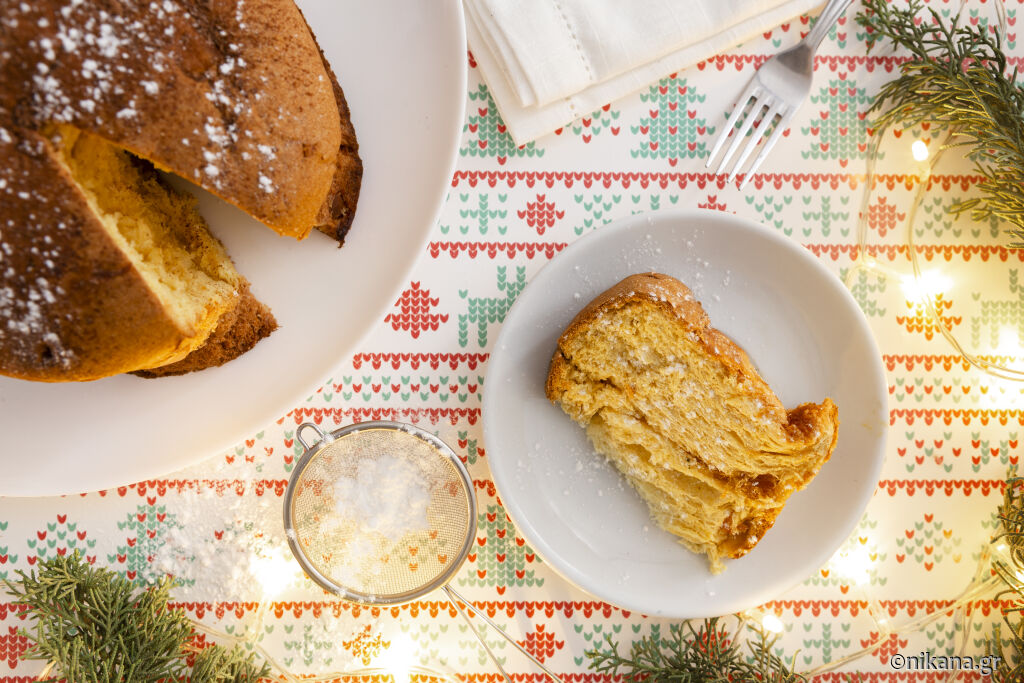New Year and Vasilopita
The central tradition associated with Saint Basil is Vasilopita - a New Year’s cake or pie into which a coin is placed\, without which New Year is inconceivable in Greece. In the text\, you will find a recipe for this delicious cake.
Like most major holidays, it is not only marked here through the calendar, but also through:
- faith,
- customs, and
- very clearly - through customary food.
In Greece, one can often recognize which holiday is being celebrated by looking at the table.
In honor and memory of Saint Basil, a special cake - Vasilopita is baked and served for New Year’s. Traditionally, it is cut exactly at midnight.
A hidden coin is placed inside it, and it is believed that whoever finds it will bring joy and happiness in the coming year.
According to legend, Saint Basil, wanting to correct the injustice done to the residents of a village whose valuables had been taken by tax collectors, ordered cakes to be baked with items that people had lost placed inside. In this way, everyone received a part of what was rightfully theirs. This legend is considered the foundation of the Vasilopita tradition.
It is customary for the family to gather for New Year’s. We remind you that the holiday period in Greece lasts for twelve days, from Christmas Eve to Epiphany. All generations, from the youngest to the oldest, gather around the same table. The table is rich and varied, with Vasilopita at its center.
The ritual of serving Vasilopita has a special place in the holiday night. When the clock strikes midnight and fireworks can usually be heard outside, the ritual begins at the table, with roots dating back to the early centuries of Christianity and the figure of Saint Basil, a great philanthropist and protector of the poor. In many homes, the lights are turned off at midnight, and the cake is cut by candlelight.
- The first piece is dedicated to Christ,
- the second to the home,
- the third to the poor,
- and then it is distributed among the household members and guests, following tradition.
Everyone carefully looks at their piece, searching for the hidden coin, with smiles and quiet excitement.
The evening continues within the circle of family and close people, often until late at night. In smaller towns and villages, public events are almost non-existent before midnight - the younger ones go out only after the family gathering. In larger cities, such as Thessaloniki and Athens, celebrations are organized in the squares, with concerts and fireworks. Here you can see the celebration program.
And Saint Basil, at least in the popular feeling, remains a quiet and unobtrusive symbol of everything that the New Year in Greece should bring: kindness, unity, and love - values that have endured for centuries.
Recipe for Vasilopita - a cake for luck and prosperity
Vasilopita is a cake whose dough varies from place to place. We present a recipe by Katarina Koxeila (@grcka_kuhinja).
Ingredients
- 300g butter (at room temperature)
- 250g powdered sugar
- 4 eggs (at room temperature)
- 75ml milk
- 400g flour
- 1 packet baking powder
- 1 packet vanilla sugar
- 1 teaspoon ground mahlep
- ¼ teaspoon ground mastic
- ½ teaspoon ground cardamom
- ½ teaspoon ground nutmeg
- Grated zest of one orange
- 100g finely chopped candied fruit (optional)
Note: If you cannot find some of the spices, feel free to omit them. Vasilopita is made with love, not by a strict formula.
Preparation
As with the preparation of most cakes, it is important for all ingredients to be at room temperature. You can find the spices in specialized stores with Greek products or health food stores. If you cannot find some of them, simply omit them - the important thing is not to give up on making Vasilopita.
- In a large bowl, beat the butter and powdered sugar with a mixer for about five minutes, until you get a light and fluffy mixture.
- In a smaller bowl, mix all the spices (mahlep, mastic, cardamom, nutmeg, and vanilla sugar) and add two tablespoons of flour. If necessary, grind the mixture in a blender, especially if some of the spices are in pieces. Add this mixture to the butter and sugar, grate the orange zest, and continue mixing with the mixer on low speed.
- Preheat the oven to 180°C. Butter a pan with a diameter of about 26 cm, dust with flour, and line with parchment paper if necessary. Pour the mixture into the pan and at this point, insert the lucky coin, carefully hiding it in the cake. Smooth the surface and bake for about 45 minutes without opening the oven.
- After baking, allow the cake to cool, remove it from the pan, and decorate as desired.
Try the Vasilopita recipe and watch the video preparation HERE.
Experience: How my first New Year’s on Thassos, Greece looked like - surprise and discovery
“As I mentioned earlier, New Year’s on the island is hardly celebrated.
The first New Year’s Eve, upon my arrival on the island, was very difficult for me. Not a trace of a holiday atmosphere, no pre-New Year’s excitement, hours wasted in vain designing a New Year’s outfit, money spent on a sequin dress :-)
I think I spent the evening comparing my “celebration” in my thoughts with the celebrations of my friends in Serbia.
I was 24 years old, I think… and the fact that I would fall asleep before midnight was “devastating”. No, I couldn’t wish that even on my worst enemy at the time, and I dared not imagine how I would respond to the famous questions: “How was your New Year’s Eve?” Uh. And I realized that I would only be able to see a snowy New Year’s night in picture books in the future.
As the years went by, I realized and accepted that New Year’s can be celebrated differently, and in the end, Serbia and the big cities in Greece are not as far away as I thought back then. Besides, I also realized that the fact that a new year is coming does not conceal any special reason for celebration. Perhaps that comes with age :-”
Ana N.
We are always here to help you explore Greece! Follow us for the latest information, useful tips, and authentic experiences to make your holiday in Greece unforgettable!
We offer over 3,000 accommodations. Choose the one that suits you and your family by clicking HERE.
+
Internet as soon as you cross the border
You can have Internet as soon as you cross the border by purchasing our Nikana eSIM card here: https://nikana-esim.com/
Setting up is very simple, via a barcode in a few seconds you will have internet on your phone for any country in the world.
Detailed instructions, how to check if your phone supports eSIM and answers to all questions can be found here: Nikana ESIM internet
Follow us on social media where we regularly share exclusive offers, discounts, and special holiday packages for Greece, as well as information, tips, and useful news.
Facebook: Nikana.gr
Instagram: @nikana.gr
Tiktok: nikana.gr
Facebook group: Live from Greece
YouTube channel @NikanaTravel
Email us at: nikana@nikana.gr
Visit our website nikana.gr, the leading source of information about Greece in the Balkans.
1 comment
Post a Comment
NOTE
All your questions in the comments will receive an answer via email so check your inbox shortly after you posted comment. For more detailed questions and responses, contact us via mail nikana@nikana.gr.









Biljana Husios03.01.2012 01:25:54
:D Seti se da ja zivim u Skala Sotirosu i odmah ce ti biti lakse! Inace si me jako razveselila opisom svog prvog "doceka" ovde, verovatno se sve mi pomalo osecamo tako za svaki docek. Meni najteze pada curka za Bozic, ali eto...